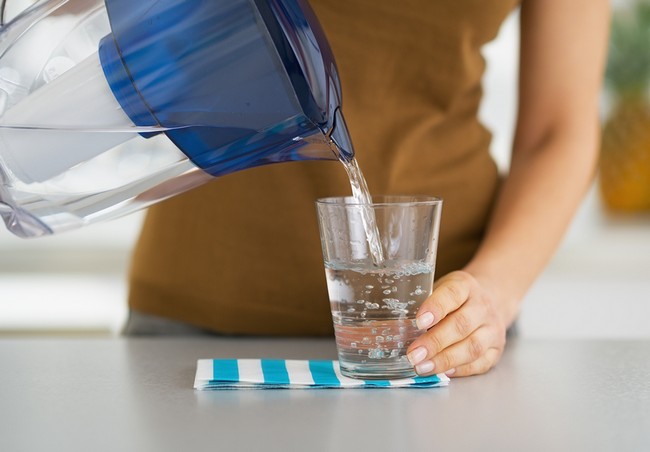- Make It Yourself Lavender Heart-Shaped Bath Bombs!
- 20 Things You Never Knew About “Down There”
- 12 Best Foods For Those Suffering From Arthritis Pain
- 12 Personal Hygiene Mistakes Almost Everyone Makes (Mom Never Told You About #4!)
- 15 Medicinal Plants And Herbs From The Cherokee People
- 12 Mind-Blowing Benefits Of Drinking Coconut Water During Pregnancy
- 12 Outstanding Winter Foods That Won’t Fatten You Up Like A Christmas Turkey
Are You Sick and Tired of Being Sick and Tired? You Might be Dehydrated

Photo credit: bigstock.com
Does it seem as if you have frequent headaches? Are you constantly tired, have digestion problems, high cholesterol, and gain weight simply looking at a cookie? You might be dehydrated. Seriously dehydrated. Many people head to the doctor looking for a solution to these types of problems but rarely do you find a doctor who would ask you how much water you drink per day
When your body becomes dehydrated this means that you are losing water (or using water) faster than you are consuming water. When this happens, your body will pay a heavy price. Depending on the level of dehydration, these consequences could range in severity from minor to serious. Without sufficient water, we face such minor problems as tiredness, headaches, premature aging, and more severe problems such as asthma, seizures, even death.
If you think of your body as a factory, which needs a large staff to keep it working properly, but little by little, staff members fail to show up. Before you know it, you have a heavy workload that must get done and almost no one around to do it. You have to start making priority choices as to what gets done and what doesn’t. If things do not improve, the “factory,” your body, could fail.
Dehydration not only happens in the hot summer months, but also in the icy conditions of winter. Many people feel they don’t need as much water in the winter because they are less active but this is not necessarily true.
Keep reading and find out the many symptoms dehydration can cause. If any of these sound familiar, it might just be time for you to take a much needed H2O break.
1. Irritability
The University of Connecticut’s Human Performance Lab conducted studies that showed there was a link between negative mood swings and dehydration. These mood swings occurred even if the dehydration was still in its beginning stages. It’s fairly obvious that your body isn’t happy when it doesn’t get its share of water.
2. Fatigue
This is much more common than you might think. When you see professional athletes completely worn out, you might think that muscle exertion is the only cause of their exhaustion, but studies show that much of an athlete’s exhaustion is due to dehydration. You don’t have to be an athlete to feel the effects of dehydration. Not drinking enough water will leave your muscles feeling drained since your heart is working overtime pumping oxygen and nutrients through thickened blood. Find out how to fight chronic fatigue with adrenal nutrition.
Continue to Page 2

Photo credit: bigstock.com
3. Premature Aging
Water hydrates the body’s tissues, keeping them plump and firm looking. It’s important to note that a lack of water is a much greater risk factor for older individuals and without the proper water balance in a body, you are much more susceptible to the types of chronic diseases that are associated with aging. Read about super anti-aging oil you have never heard about.
4. Spikes in Blood Pressure
When someone is dehydrated, the blood in the body thickens. This makes it much more difficult for the blood to flow to certain parts of the body. An increase in resistance means an increase in blood pressure, which is associated to stroke, heart attacks, and cardiovascular disease.
5. Kidney or Bladder Problems
Dehydration can allow bacteria and toxins to build up inside your kidneys and/or bladder, as they are not being flushed out with sufficient amounts of water. Imagine washing dishes with just a trickle of water, it’s very similar with your body. A lack of water can also cause damage to your kidneys, and this can actually stop them from working all together. It’s estimated that 80 percent of persons who have kidney stones are dehydrated. Avoid painful kidney stones by making certain your body gets all the water it needs.
6. Joint Pain
Our joints are very complex systems that take a real beating in an average day, especially joints that can bear the weight of more than 4 times our own body weight, like our knees and ankles. Water forms a type of pillow that relieves the tension in our joints and keeps them from feeling stiff and sore. If you think you might have arthritis, try drinking more water and see if this doesn’t solve your joint pain.
7. High Cholesterol Levels
Many times high cholesterol isn’t due to the foods you eat, but a lack of water. Your body raises your blood cholesterol levels in an attempt to stop your cells from losing water.
Continue to Page 3

Photo credit: bigstock.com
8. Asthma and/or Allergies
When your body does not have enough water, it initiates certain defense mechanisms. Your nose and throat will constrict in an effort to conserve water. As a result, people with asthma or those who suffer from allergies, will find it even more difficult to breath than normal.
9. Skin Issues
Water allows your body to flush toxins from your skin to keep it healthy and youthful looking. Without sufficient water, your skin is much more likely to develop problems such as dermatitis and psoriasis.
10. Weight Gain
In an attempt to get some water, sometimes your body tells you it’s hungry. It hopes you will drink water with your meal, or that you will eat some water rich foods. When you are suffering from low energy levels and a low metabolic rate as a result of dehydration, you will more than likely gain weight as you continually eat in an attempt to satisfy your body.
SEE ALSO: 14 Surprising Reasons for Dehydration
11. Digestive Problems
Your colon needs water to float things along, if you catch our drift. You can avoid constipation and have regular, healthy bowel movements if you drink sufficient amounts of water. Other digestive issues related to a lack of water are gastritis and ulcers.
12. The Afternoon Headache
Most people think that their daily, afternoon headache is due to stress or perhaps to a lack of caffeine, but it just might be your body asking you take an H2O break. Before you reach for that over the counter pain relief, try drinking one or two glasses of the pure stuff and see if your headache disappears.
Everyone knows that drinking eight – 8 ounce glasses of water each day is what doctors recommend, but that number can actually vary depending on several factors such as your health, how active you are, your climate, and your overall body mass. Your water intake will depend on all of the above factors.
Sources:




























